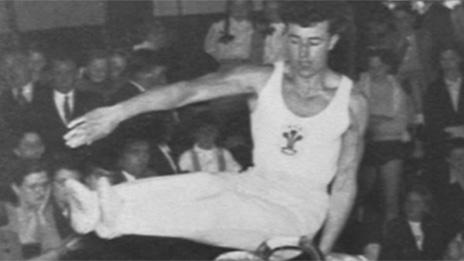London 2012: Games memories for 1948 Olympian
- Published
A Swansea pensioner will be watching the gymnastics at the Olympics more avidly than most - he was a competitor when the Games last came to London.
Glyn Hopkins, 83, was a member of the gymnastics squad in 1948 and now, more than 60 years later, he has tickets to the gymnastics final in July.
He said these Olympics would be "very different" to the post-World War II Olympics, dubbed the "austerity games".
While Olympians in 2012 have access to the best trainers and nutritionists and have kit designed by Stella McCartney, life for competitors in 1948 was "another world".
"Times were tough as it was just after the war," said Mr Hopkins, who followed his father into gymnastics and trained at the Sketty Olympic Club, coached by Arthur Whitford, who was a 10-times Great Britain gymnastics champion.
"We were still on basic food rations and coupons and there was no money about. Saying that, I think we were quite fit because the diet wasn't a fatty diet.
"I remember while we were training for the Olympics we stayed in the Crown and Manor Boy's Club in Islington in London and our sleeping quarters were gym benches - the long thin ones like in schools.
"We had to put them together and we all slept in rows. As you can imagine, we didn't get very much sleep.
"We also didn't have any special uniform. We were given a vest, a competition blazer and a tracksuit - they were very, very basic.
"But everything at that time was."
He said the team training equipment was built in the 1930s and "didn't really work very well".
"For example, the horizontal bars during the Olympics had a movement of about 12 inches. But our training ones had no movement at all. So it was hard to prepare for that," said Mr Hopkins, who lives in Morriston, Swansea with his wife of 58 years, Valerie.

"Now gymnasts have a well filled with polystyrene under the bars to land in if they fall, whereas we had to fall on hard coconut matting and that really hurt.
"So now there is less fear and that means gymnasts are able to do more show-stopping moves.
"They also now wear leather around their hands whereas we could only use chalk.
"What would happen is that the chalk would build up on the bars and it would tear your hands.
"Many a night I would go to bed with a sock on my hand filled with Vaseline because of the blisters."
But despite the austerity, he said the 1948 games united the country after the tragedies brought by World War II.
"I remember walking out into the stadium for the opening ceremony in front of a crowd of about 75,000 people and the hairs on the back of my neck stood up," said Mr Hopkins, who had to fit in his training and competitions around his day job as an apprentice joiner.
"It was such a memorable moment. And because the tickets weren't very expensive, lots of ordinary people could come and watch us.
"It brought everyone together, which I think was needed after the war."
In fact, in preparation for the Olympics, the Great Britain gymnastics team worked with the German prisoner of war Helmut Bantz.
While German athletes were banned from competing at the 1948 Games, Bantz was acting as the - unofficial - coach of the team.
"He was given permission to come with us and coach us as a team before the Olympics," said Mr Hopkins.
"He performed for us on the high bar and he hadn't done anything like that since before the war. He really helped us and was a really nice man.
"He went on to win gold for Germany in future Olympics."
The British gymnastics team eventually came 12th during the Games, with Finland getting gold and Czechoslovakia coming second.
Mr Hopkins said: "They were the successful teams of the time, more so than the Chinese and Russians, who do so well now."
As a former member of an Olympic team, he said he had been promised two tickets for the gymnastics final during London 2012.
"I'm expecting it to be quite different from our day," he added.
"It will bring back lots of memories."